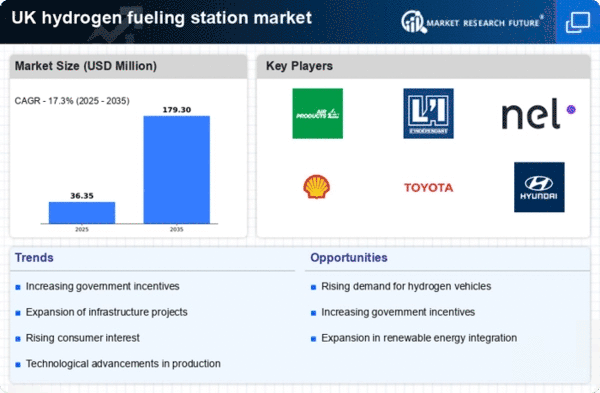Regulatory Support for Clean Energy
The hydrogen fueling-station market in the UK benefits from robust regulatory frameworks that promote clean energy solutions. The UK government has established various policies that incentivize the development of hydrogen infrastructure, including funding programs and tax incentives. For instance, the Hydrogen Strategy outlines a vision for a hydrogen economy, aiming for 5 GW of low carbon hydrogen production capacity by 2030. This regulatory support not only encourages investment in hydrogen fueling stations but also aligns with the UK's commitment to achieving net-zero emissions by 2050. As a result, stakeholders in the hydrogen fueling-station market are likely to experience increased confidence and investment opportunities, fostering growth in this sector.
Rising Interest in Alternative Fuels
The rising interest in alternative fuels is significantly impacting the hydrogen fueling-station market in the UK. As consumers and businesses seek sustainable energy solutions, hydrogen is increasingly viewed as a viable alternative to fossil fuels. The UK government has set ambitious targets for reducing carbon emissions, which has led to a growing demand for hydrogen-powered vehicles. According to recent data, the number of hydrogen fuel cell vehicles on UK roads is projected to reach 20,000 by 2025. This surge in demand for hydrogen vehicles is likely to drive the need for a corresponding increase in hydrogen fueling stations, thereby stimulating market growth.
Investment in Infrastructure Development
Investment in infrastructure development is a critical driver for the hydrogen fueling-station market in the UK. The government and private sector are increasingly allocating funds to build a comprehensive network of hydrogen stations. Recent reports indicate that the UK plans to invest approximately £1.5 billion in hydrogen projects over the next few years. This investment is expected to enhance the accessibility of hydrogen fueling stations, making them more convenient for consumers and businesses alike. Furthermore, the establishment of strategic partnerships between energy companies and automotive manufacturers is likely to accelerate the deployment of hydrogen infrastructure, thereby supporting the growth of the hydrogen fueling-station market.
Public Awareness and Education Initiatives
Public awareness and education initiatives are crucial for the hydrogen fueling-station market in the UK. As the market evolves, it is essential to inform consumers about the benefits and availability of hydrogen as a fuel source. Various campaigns and educational programs are being launched to raise awareness about hydrogen technology and its environmental advantages. Increased public knowledge can lead to higher acceptance and adoption of hydrogen vehicles, which in turn drives demand for hydrogen fueling stations. The UK government, along with industry stakeholders, is likely to invest in outreach efforts to ensure that the public is well-informed, thereby supporting the growth of the hydrogen fueling-station market.
Technological Innovations in Hydrogen Production
Technological innovations in hydrogen production are poised to transform the hydrogen fueling-station market in the UK. Advances in electrolysis and other production methods are making hydrogen more cost-effective and efficient to produce. For example, the development of green hydrogen technologies, which utilize renewable energy sources, is gaining traction. The UK aims to produce 1 million tonnes of green hydrogen annually by 2030, which could significantly enhance the supply chain for hydrogen fueling stations. These innovations not only improve the economic viability of hydrogen but also align with the broader goals of sustainability and energy transition, thereby fostering growth in the hydrogen fueling-station market.
















